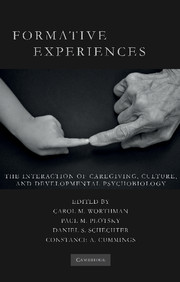Book contents
- Frontmatter
- Contents
- List of Figures
- List of Tables
- List of Contributors
- Foreword by Robert Sapolsky
- Preface
- List of Abbreviations
- Introduction
- SECTION ONE HISTORICAL, CROSS-CULTURAL, AND DEVELOPMENTAL SCIENCE PERSPECTIVES
- SECTION TWO HOW EXPERIENCE INTERACTS WITH BIOLOGICAL DEVELOPMENT
- SECTION THREE FORMATIVE RELATIONSHIPS WITHIN AND ACROSS GENERATIONS
- SECTION FOUR SOCIAL AND CULTURAL CONTEXTS OF CHILDHOOD DEVELOPMENT – NORMATIVE SETTINGS, PRACTICES, AND CONSEQUENCES
- 11 Ethnographic Case Study: Inuit Morality Play and the Danish Medical Officer
- Commentary
- Commentary
- 12 Ontogenetic Perspectives on the Neurobiological Basis of Psychopathology Following Abuse and Neglect
- 13 Ethnographic Case Study: Maria – Cultural Change and Posttraumatic Stress in the Life of a Belizean Adolescent Girl
- Commentary
- Commentary
- 14 Sex/Gender, Culture, and Development: Issues in the Emergence of Puberty and Attraction
- SECTION FIVE FEAR, FUN, AND THE BOUNDARIES OF SOCIAL EXPERIENCE
- SECTION SIX PUBLIC HEALTH, EDUCATION, AND POLICY IMPLICATIONS
- Index
- References
13 - Ethnographic Case Study: Maria – Cultural Change and Posttraumatic Stress in the Life of a Belizean Adolescent Girl
Published online by Cambridge University Press: 26 May 2010
- Frontmatter
- Contents
- List of Figures
- List of Tables
- List of Contributors
- Foreword by Robert Sapolsky
- Preface
- List of Abbreviations
- Introduction
- SECTION ONE HISTORICAL, CROSS-CULTURAL, AND DEVELOPMENTAL SCIENCE PERSPECTIVES
- SECTION TWO HOW EXPERIENCE INTERACTS WITH BIOLOGICAL DEVELOPMENT
- SECTION THREE FORMATIVE RELATIONSHIPS WITHIN AND ACROSS GENERATIONS
- SECTION FOUR SOCIAL AND CULTURAL CONTEXTS OF CHILDHOOD DEVELOPMENT – NORMATIVE SETTINGS, PRACTICES, AND CONSEQUENCES
- 11 Ethnographic Case Study: Inuit Morality Play and the Danish Medical Officer
- Commentary
- Commentary
- 12 Ontogenetic Perspectives on the Neurobiological Basis of Psychopathology Following Abuse and Neglect
- 13 Ethnographic Case Study: Maria – Cultural Change and Posttraumatic Stress in the Life of a Belizean Adolescent Girl
- Commentary
- Commentary
- 14 Sex/Gender, Culture, and Development: Issues in the Emergence of Puberty and Attraction
- SECTION FIVE FEAR, FUN, AND THE BOUNDARIES OF SOCIAL EXPERIENCE
- SECTION SIX PUBLIC HEALTH, EDUCATION, AND POLICY IMPLICATIONS
- Index
- References
Summary
I can feel the pain inside me and joy
Yes, it makes me think God's a woman too.
Chorus of song by Maria, 12 years old
Twenty percent of the world's children and adolescents suffer from a disabling mental illness, and this percentage is thought to be increasing (WHO, 2003). Moreover, subclinical mental illness is thought to compromise quality of life for thousands more children. Globalization and cultural change also appear to play a role in the worldwide increase of diagnosed mental illness among children and adolescents (WHO, 2003). One of the psychiatric illnesses linked to cultural change is posttraumatic stress disorder (PTSD). Although the sociocultural and psychological pathways that lead to an increase in diagnoses of PTSD under conditions of change such as war have been well studied, these pathways have been less carefully examined in more normative situations such as economic and cultural globalization.
One cause of PTSD is child maltreatment. Korbin (1987) has suggested a relationship between cultural change and an increase in child maltreatment, though the exact way this increase affects PTSD prevalence is unknown. Following is a well-accepted definition of child maltreatment containing three tiers:
(1) cultural practices that are viewed as abusive or neglectful by other cultures, but not by the culture in question; (2) idiosyncratic departure from one's cultural continuum of acceptable behavior; and (3) societally induced harm to children beyond the control of individual parents and caretakers.
(Korbin, 1980, 1981; 1987, p. 34)- Type
- Chapter
- Information
- Formative ExperiencesThe Interaction of Caregiving, Culture, and Developmental Psychobiology, pp. 331 - 343Publisher: Cambridge University PressPrint publication year: 2010
References
- 2
- Cited by



